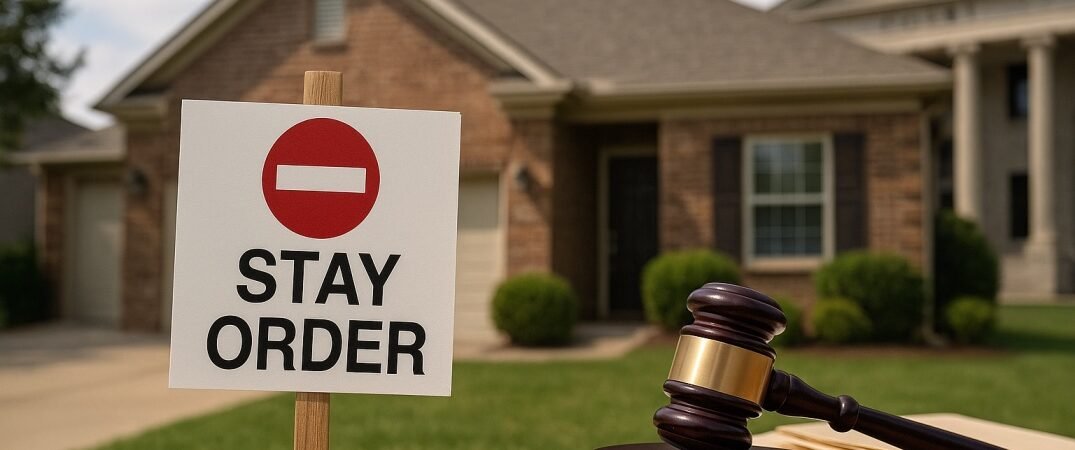A property transaction isn’t just about paperwork and payment.
It’s also about ensuring the title is legally sound and litigation-free.
One of the biggest legal red flags is if a property is under a court stay.
Let’s understand what a court stay means, why it’s issued, and whether you should ever consider buying such property.
🏛️ What Is a Court Stay on Property?
A court stay is a legal order issued by a court directing parties to maintain the current status of the property or to temporarily halt any transaction, construction, or transfer involving it.
It’s issued when a dispute or lawsuit is pending in court involving the property.
⚖️ Common Types of Stay Orders:
- Status Quo Orders
The court asks all parties to maintain the existing condition of the property — no construction, sale, or development allowed. - Injunctions
A party is restrained from taking certain actions (like selling, demolishing, or occupying the property). - Interim or Temporary Stay
Issued at the beginning of a legal dispute, pending final resolution.
🕵️♂️ Can You Legally Buy Property Under a Court Stay?
The simple answer is: You should not.
Even if a sale is not explicitly barred, buying a property under a court stay can lead to long legal battles, loss of investment, and cancellation of registration.
🚫 Risks of Buying Property Under Stay:
- Sale may be declared null and void
- Bank may refuse to finance or approve home loan
- You may become party to ongoing litigation
- Property could be attached or auctioned by court order
Even if the sale somehow goes through, you won’t get peaceful possession or marketable title, which defeats the whole point of ownership.
📋 How Can You Check If a Property Is Under Litigation or Stay?
As a buyer or lawyer, you must do due diligence. Here’s how:
🔍 1.
Check Court Records
Visit the District Court website or the High Court cause list using the property owner’s name, survey number, or address.
You can also check through the e-Courts portal:
🧾 2.
Inspect the Encumbrance Certificate (EC)
While EC shows registered transactions like mortgages or sales, it usually doesn’t show pending court cases.
So it is not enough by itself.
🧑💼 3.
Ask for a Legal Opinion
A lawyer can do title tracing and verify the chain of ownership, mutations, and previous litigation history.
In many cases, court stay orders arise from partition disputes, inheritance claims, or fraudulent sales.
📰 4.
Check for Public Notices in Newspapers
A seller may issue a notice inviting objections — but lack of objection doesn’t mean the title is clean.
🧠 Real-Life Example: Why Caution Matters
Mr. Raj bought a plot in Bangalore after checking basic documents.
However, after registration, he received a court summons — because a distant heir had already filed a stay petition claiming ancestral rights.
The transaction became voidable, and Raj is now stuck in litigation for years.
📊 Summary Table – Property Under Court Stay
| Aspect | Details |
| What is a Court Stay? | Legal order halting transactions or construction |
| Who issues it? | Civil Court, High Court, or other competent authority |
| Can you buy property under stay? | Not advisable — risks legal cancellation |
| How to detect? | Check court portals, engage a lawyer, trace title history |
| Impact on buyer | No possession, litigation risk, financial loss |
❓ FAQs
1. Can a sale deed be registered if property is under court stay?
Sometimes yes, but the registration itself can be challenged in court and rendered invalid later.
It’s legally risky.
2. What happens if I unknowingly buy such property?
You may be forced to vacate or lose money unless protected under the principle of bona fide purchaser without notice.
But proving that is difficult.
3. Are court stays mentioned in EC?
No. Encumbrance Certificates do not reflect litigation or court orders unless officially recorded or attached.
4. Can a bank give loan on a property under stay?
Highly unlikely. Banks require clean and marketable title.
5. What legal documents must be verified to avoid such risks?
- Title deed
- Mother deed
- RTC (Pahani)
- Mutation register
- Pending litigation search
- Certified copy of survey map
📢 Call to Action
Buying or selling property? Don’t risk it without a legal check.
A quick online search isn’t enough when lakhs (or crores) are at stake.
👉 For expert title verification, property document vetting, or a legal opinion, reach out to us today.
📞 Mobile: +91 80884 17193
🌐 Website: rjpropertylaw.com
📧 Email: ranjinijayaram@rjpropertylaw.com
Let’s make property law simple, safe, and stress-free for you.

